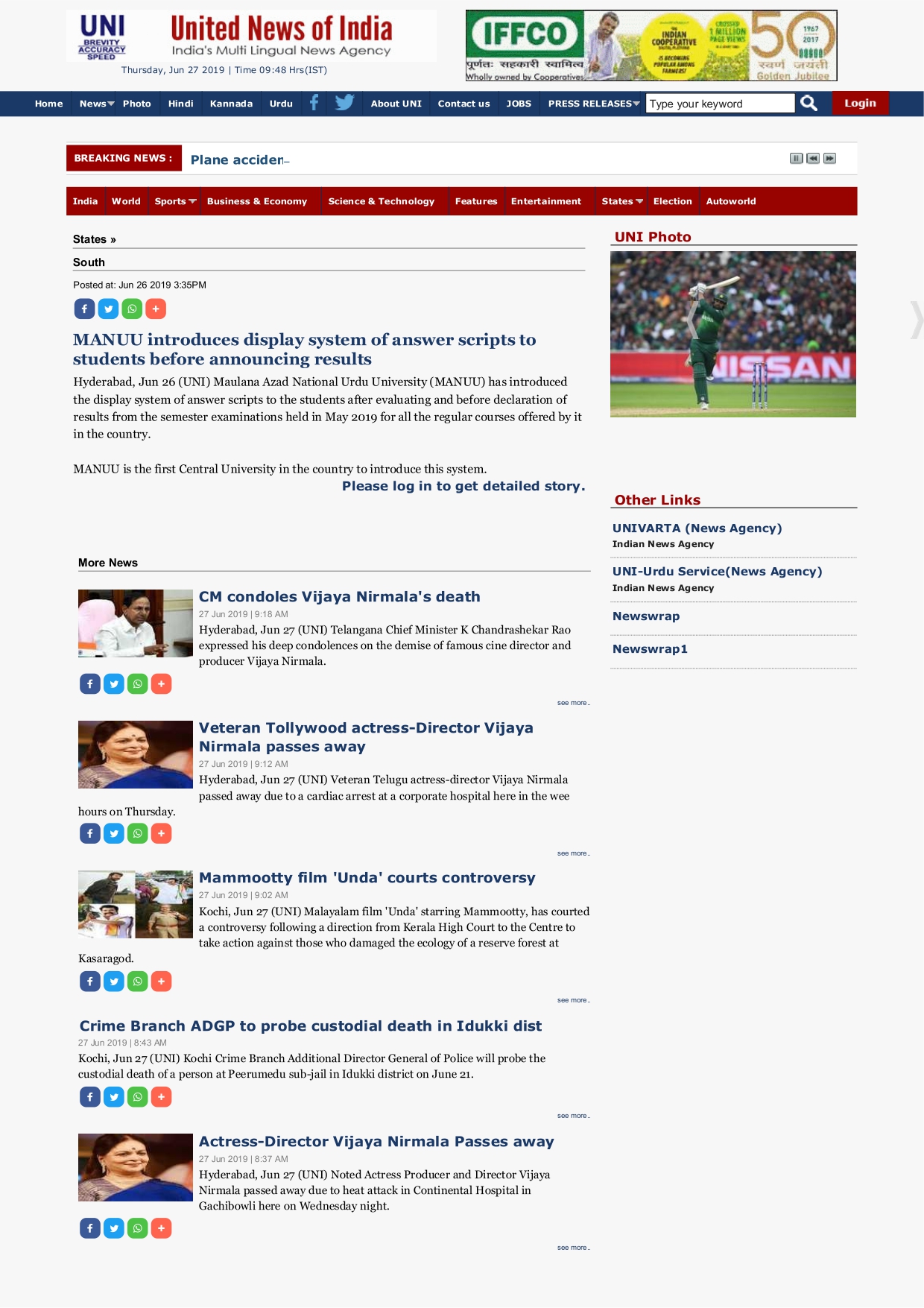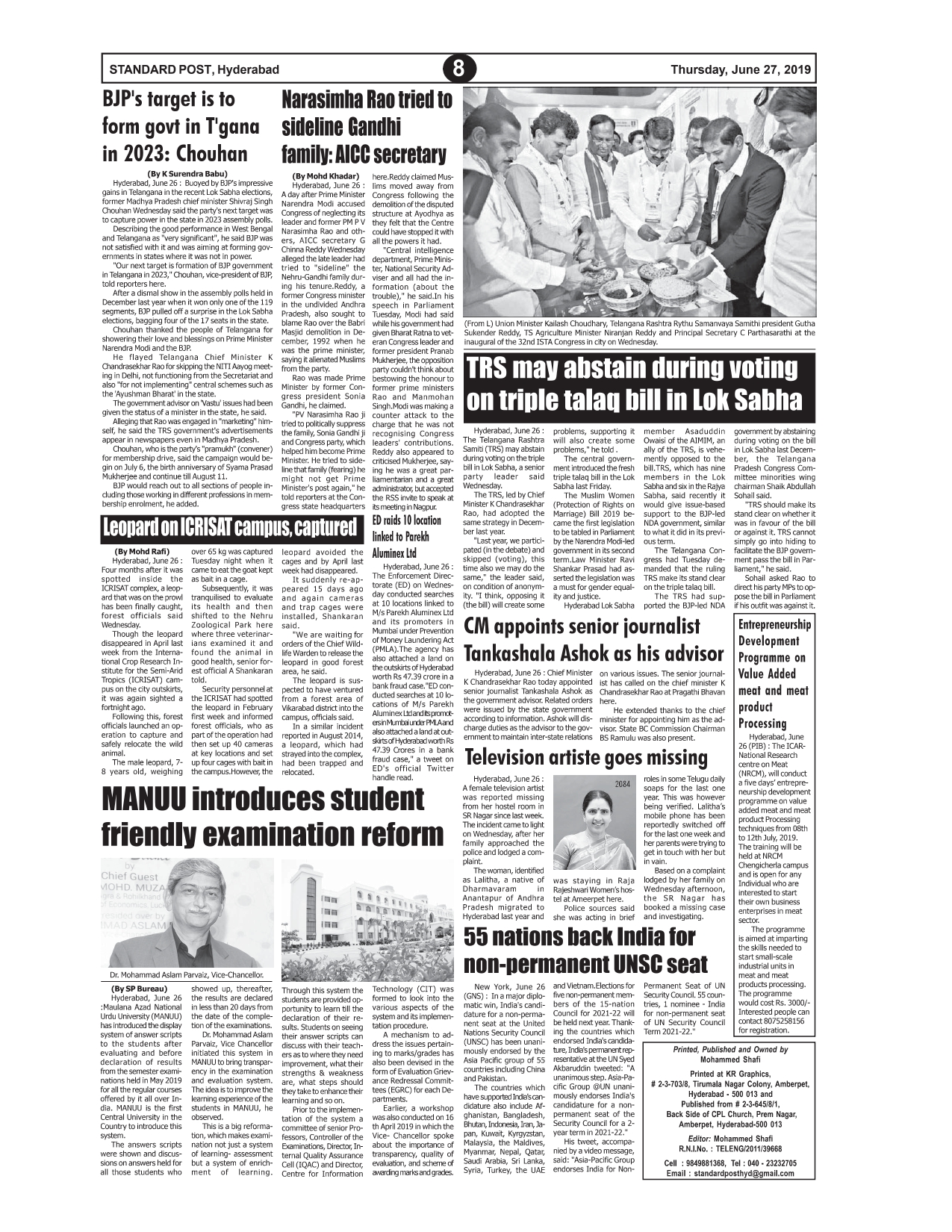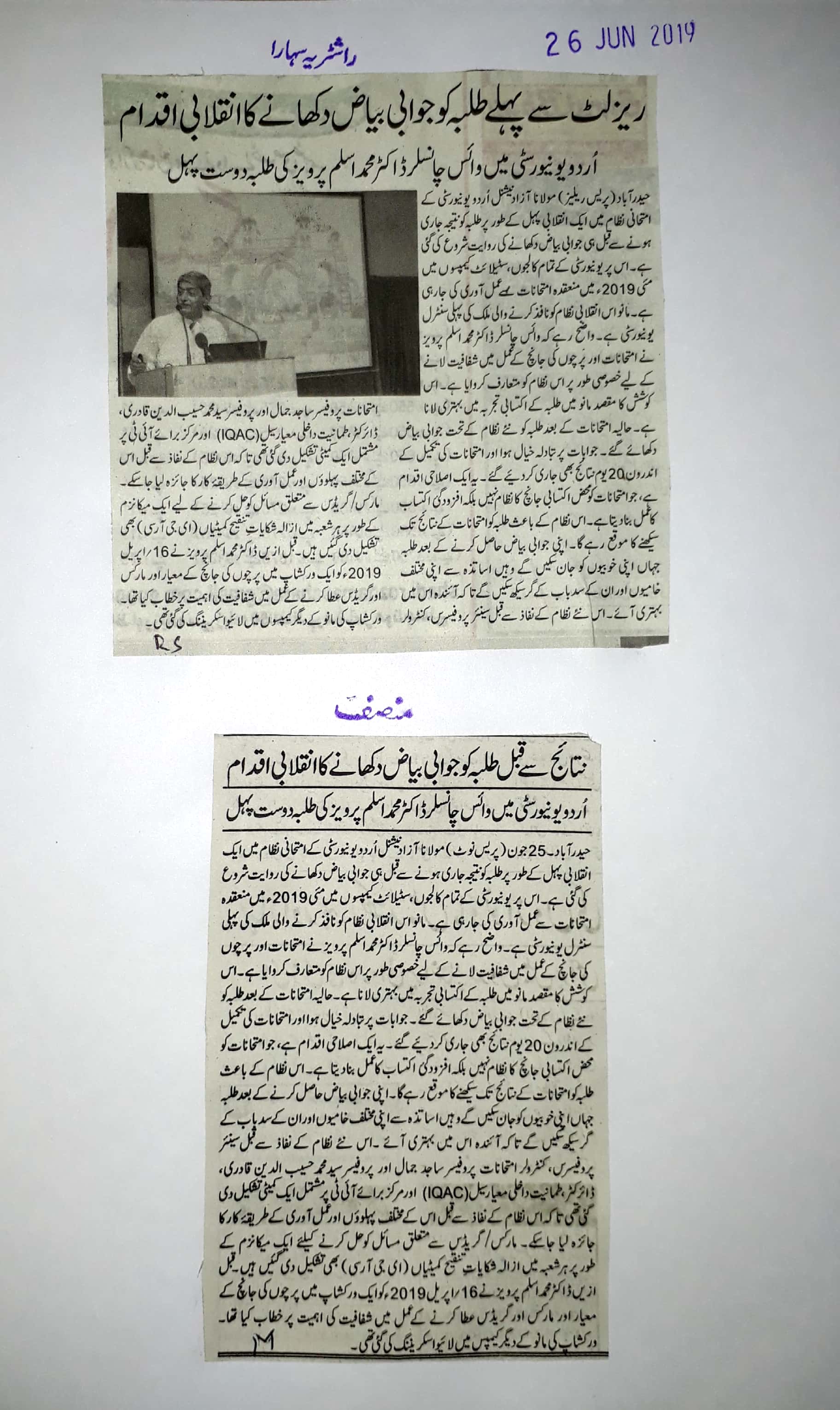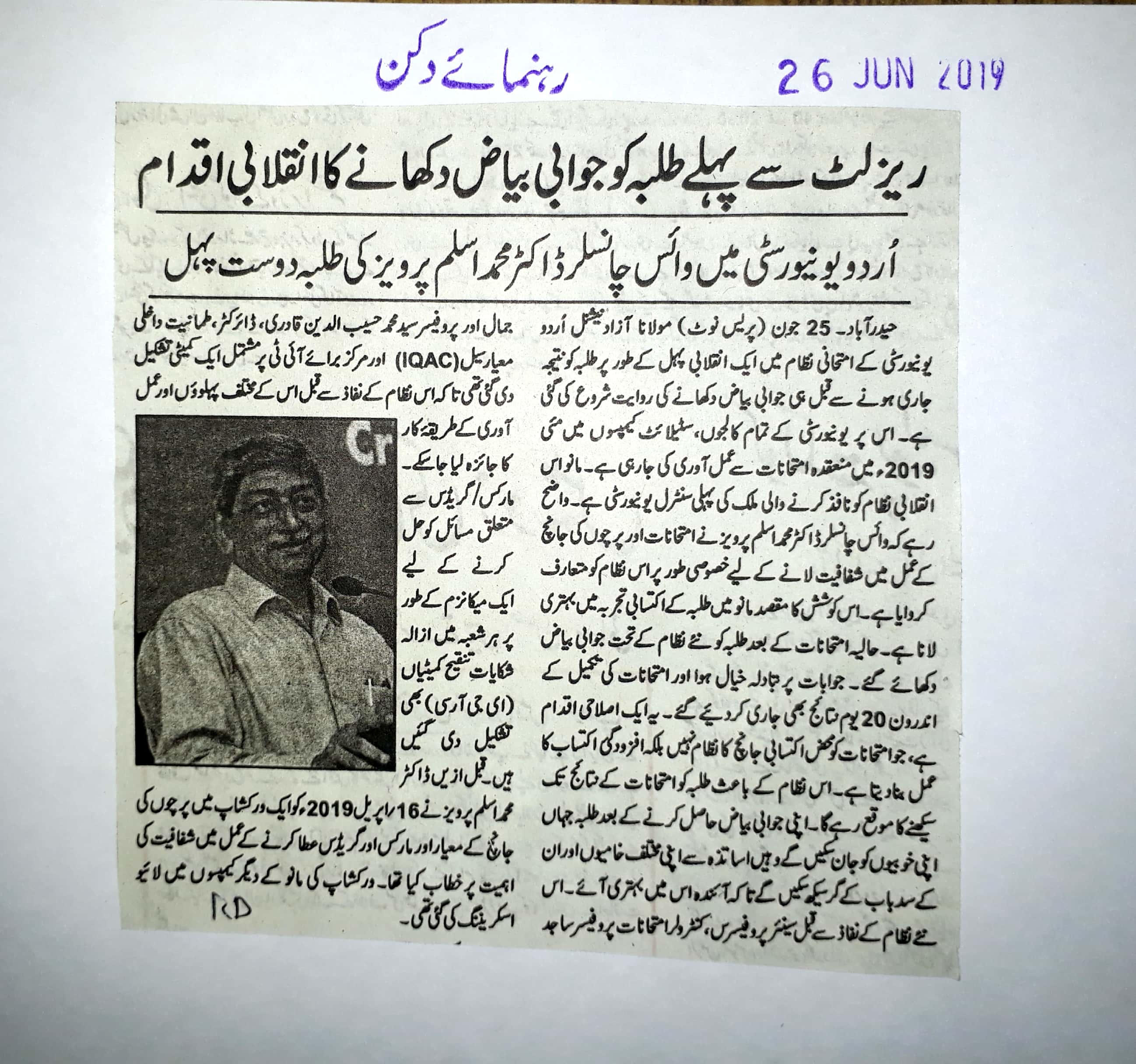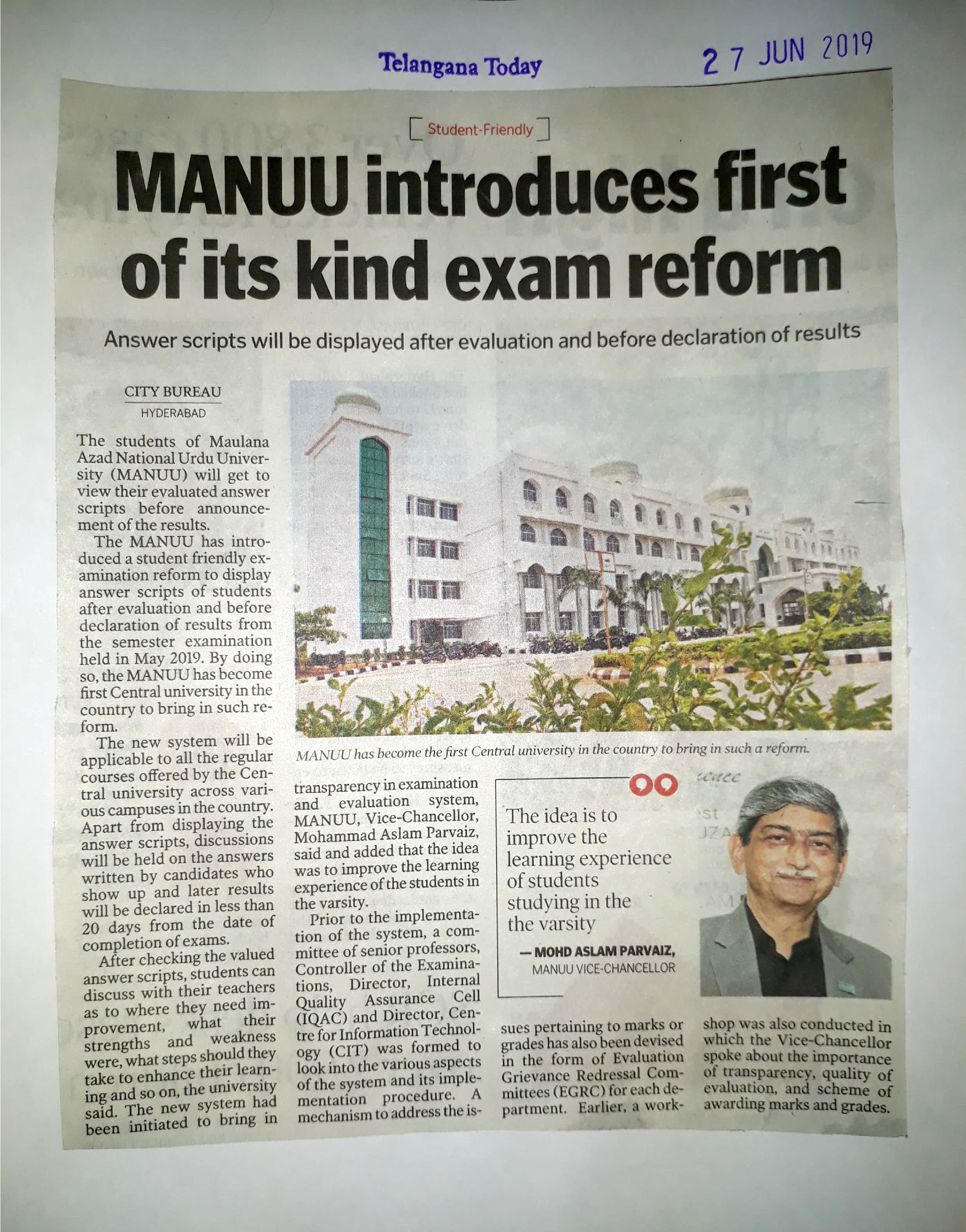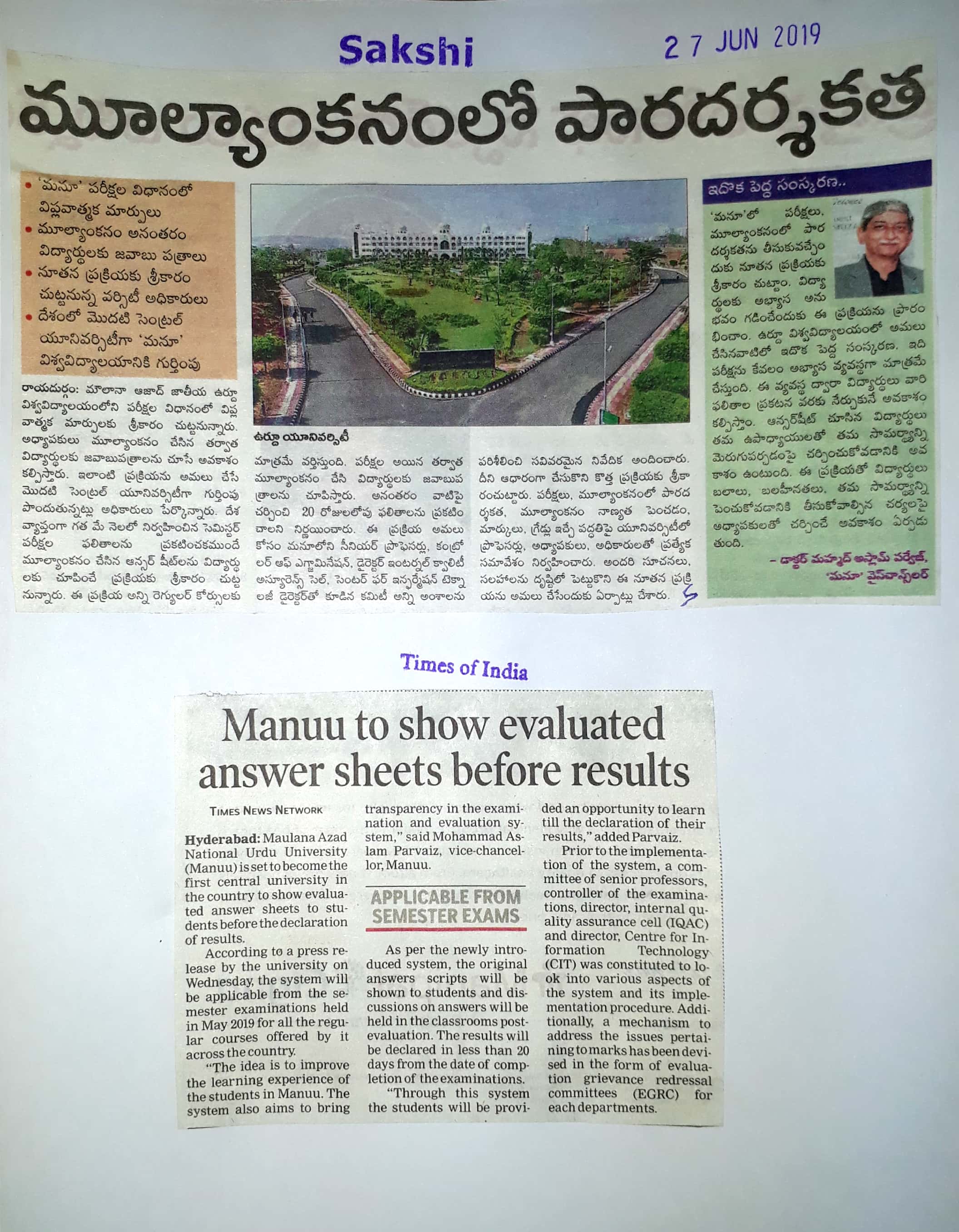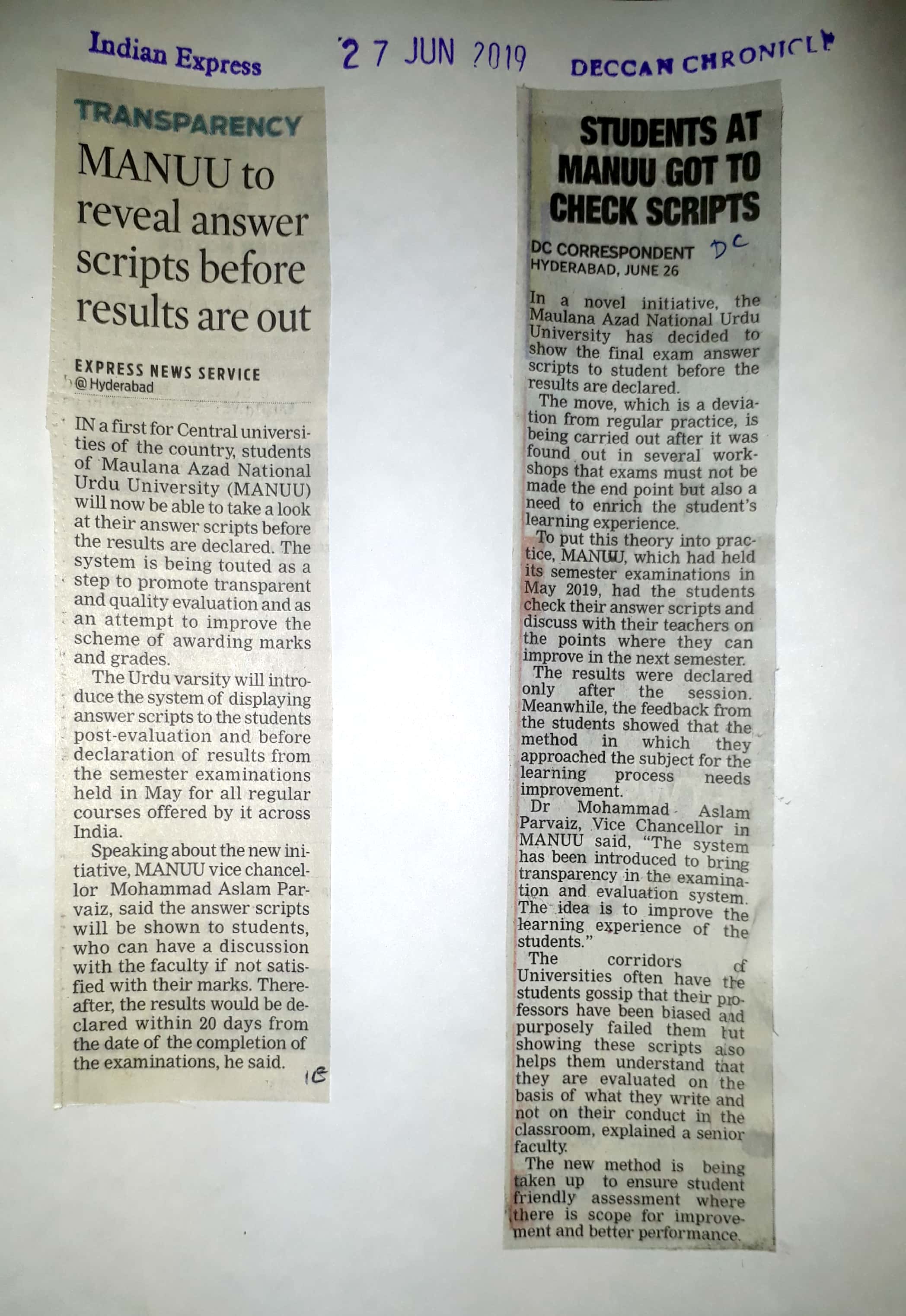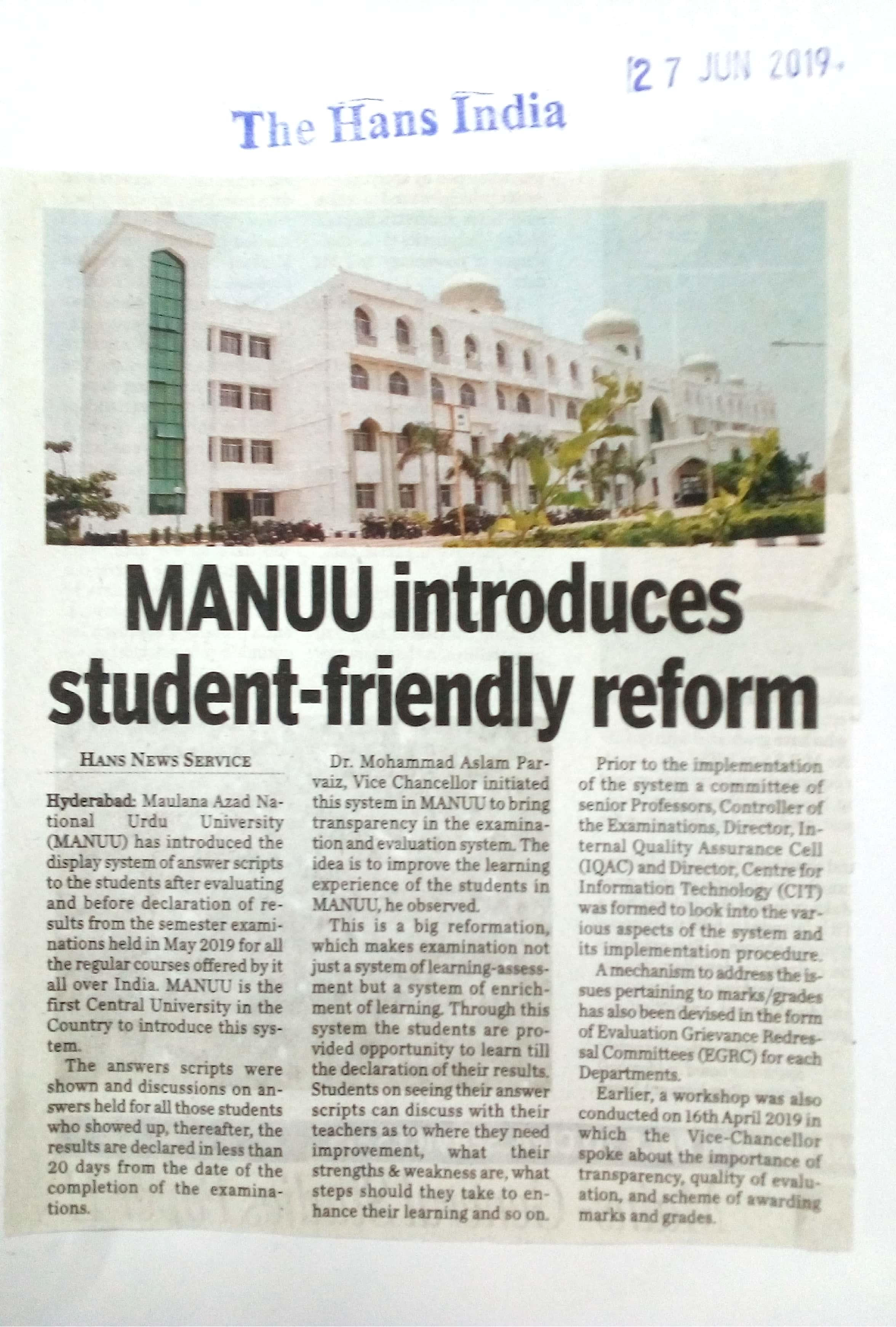University Best Practices
- Title of the Practice
Display and Discussion of the Answer Scripts
- Objective of the Practice
Showing the answer scripts to the students and holding discussion on answer scripts with them is a practice aimed at one hand, to improve and strengthen the learning experience of the students, and on the other to make evaluation process transparent and accountable. It is expected that upon seeing their answer scripts, the students shall identify their strengths and weaknesses of learning, and discussing these with their teachers shall help them improve their knowledge of the subject, rectify the errors they make and advance their understanding of the subject. This practice is enlivened by the idea that the one who teaches is in the best position to assess and advise, and the one who learned, has the right to know if they learned properly. Connected to this idea are the notions of transparency and learning outcomes. It is believed that the learning outcomes can be measured accurately, through this practice.
- The Context
The Academic Council of MANUU in its 32ndMeeting held on 4th October 2018, on the request of student community to make the answer booklet available to them after evaluation, discussed the matter at length and resolved to constitute a Committee to examine the feasibility of making the answer scripts available to students, as part of the examination reforms. (https://manuu.edu.in/sites/default/files/2020-01/32nd%20AC%20Minutes_0.pdf)
The Committee held a meeting on 30th January 2019 in the office of the Controller of the Examination and discussed various issues involved in making the the answer scripts available to the students after the evaluation. The Committee evolved a procedure in this regard, and submitted the minutes of the meeting to the Vice Chancellor on 15th February 2019. The minutes of the meeting were placed in the 34th Academic Council meeting held on 7thMarch 2019, wherein they were approved and the practice was ready to be implemented for the semester examination scheduled in May 2019. (https://manuu.edu.in/sites/default/files/2019-10/Minutes_of_34th_AC_Meeting.pdf)
Subsequently, the time tables for the semester examinations of all the programmes commencing in May 2019 were notified.
- Time Table with Answer Script Display and Discussion Schedule-PhD
- Time Table with Answer Script Display and Discussion Schedule-MSC Maths
- Time Table with Answer Script Display and Discussion Schedule-M.Tech CS
- Time Table with Answer Script Display and Discussion Schedule-MCA
- Time Table with Answer Script Display and Discussion Schedule-MSW
- Time Table with Answer Script Display and Discussion Schedule-M.Ed
- Time Table with Answer Script Display and Discussion Schedule-M.COM
- Time Table with Answer Script Display and Discussion Schedule-MBA
- Time Table with Answer Script Display and Discussion Schedule-MA Arabic
- Time Table with Answer Script Display and Discussion Schedule-MA English
- Time Table with Answer Script Display and Discussion Schedule-MA JMC
- Time Table with Answer Script Display and Discussion Schedule-MA Persian
- Time Table with Answer Script Display and Discussion Schedule-MA Sociology
- Time Table with Answer Script Display and Discussion Schedule-MA Urdu
- Time Table with Answer Script Display and Discussion Schedule-MA Translation
- Time Table with Answer Script Display and Discussion Schedule-MA Women Studies
- Time Table with Answer Script Display and Discussion Schedule-MA Public Admin
- Time Table with Answer Script Display and Discussion Schedule MA Political Science
- Time Table with Answer Script Display and Discussion Schedule MA Islamic Studies
- Time Table with Answer Script Display and Discussion Schedule MA History
- Time Table with Answer Script Display and Discussion Schedule MA Hindi
- Time Table with Answer Script Display and Discussion Schedule MA Economics
- Time Table with Answer Script Display and Discussion Schedule B.COM
- Time Table with Answer Script Display and Discussion Schedule B.Ed
- Time Table with Answer Script Display and Discussion Schedule B.A (Lucknow and Hyderabad)
- Time Table with Answer Script Display and Discussion Schedule B.Sc
- Time Table with Answer Script Display and Discussion Schedule B.Sc Backlog
- Time Table with Answer Script Display and Discussion Schedule D.EL.Ed
- Time Table with Answer Script Display and Discussion Schedule Diploma
Further, the Committeedecided to discuss the initiative with all the stakeholders of MANUU, particularly with the teaching faculty. Subsequently, a workshop was conducted jointly by Examination Branch, Internal Quality Assurance Cell (IQAC) and Centre for Information Technology (CIT), with the theme, Examination Reforms on 16th April 2019, and its webcast was made live all across MANUU campuses and Colleges of Teacher Education (CTEs) in India. This is followed by a lengthy session of discussion with the faculty (YouTube: https://youtu.be/nlYdanLWalE).
After the workshop, the issues raised by the teaching faculty of MANUU, were clarified by Examination Branch and IQAC in an orderly way. (https://manuu.edu.in/sites/default/files/MANUU-IC/2021-03/Clarifications.PDF)
MANUU had issued a press release of the workshop and implementation of the system of display of answer scripts to the students. A wide coverage in the press had been given of MANUU’s Examination Reforms. (https://manuu.edu.in/Best-Practices)
- The Practice
The general dissatisfaction of the students in respect of the marks and the grades that they score is addressed through this practice of showing the answer scripts to them and holding discussion thereof with them. This initiative provides students the opportunity to see what they have written, and how have they been evaluated, and where is the scope for their improvement.
After conducting the examination, the Examination Branch had sent the answer scripts to the Heads of the Departments for distribution of the answer scripts to the respective teachers who taught the courses. After evaluation, scrutiny and moderation, the teachers were allowed to show the answer scripts to the students and hold discussion with them. The students had been asked to visit the teachers who taught any course to them and see their answer script and seek clarification or suggestion if any. Since one to four days had been allocated for the display and discussion on the answer scripts, the teachers stayed back during the allocated period from morning till evening to show the answer scripts to their students, and discuss and counsel them academically about their performance in the examination and the level of their learning. After seeing the answer scripts and discussing about their performance, the students were required to sign the attendance proforma of display of the answer scripts. When the display and discussion period was over, the teachers entered the marks in their respective iUMS portal, and the answer scripts and the attendance proformas were sent to the Examination Branch. Consequent upon receiving these, the Examination Branch declared the results.
The moderation boards of all the departments and colleges had taken care to address the issues of scrutiny, and over or under awarding of marks, before the answer scripts made available for the students.
It has been made clear to all the students that if any of them is not satisfied with the marks awarded to him/her, he/she can approach the Examination Grievance Redressal Committee (EGRC) in the Department which comprises Head, a senior teacher, and the course teacher. Whatever decision the EGRC makes, it is final. Yet again, if the student is not satisfied, then he/she can apply for re-evaluation on payment of prescribed fee after the declaration of routine results.
- Evidence of Success
The practice had been appreciated by the students. A good number of students showed up to see their answer scripts, as it is evident from the attendance proforma of answer script display. (https://manuu.edu.in/sites/default/files/MANUU-IC/2021-03/FINAL-PG-LIST.pdf)
As the practice of displaying and discussing of the answer scripts commenced from the even/end semester examinations, that is, May 2019, a large number of students had returned to their native places right after the end of the examinations for summer vacations. The evaluation process had been been completed by the scheduled dates notified by the Examination Branch, but the students had booked the tickets with public transportation rather earlier. When the University reopened after summer vacations for the academic session in July2019, those students who had not seen the answer scripts, requested the University authorities that they be provided the opportunity to see their answer scripts. Thus, the University allowed the students to see their answer scripts again from 19th to 21st August 2019 for the semester examinations held in May 2019. This is a strong indicator towards the success of the practice and its implementation.
(https://manuu.edu.in/sites/default/files/MANUU-IC/2021-03/Circulars-regarding-answer-script-display.pdf)
With the Odd semester examinations held in December 2019, the practice had been more strengthened. (https://manuu.edu.in/sites/default/files/MANUU-IC/2021-03/FINAL-UG-LIST.pdf)
One of the biggest gains of this practice is the assessment of the students in terms of learning outcomes. A paper setter is required to set the paper strictly in accordance with the course objectives and outcomes; then next is evaluation, that is, the examiners are required to value the answer scripts thoroughly, providing comments in the answer scripts pointing the shortcomings and excellence in terms of learning; and finally, when the students show up to see their answer scripts, they are provided sincere academic assessment as to the level of their learning and understanding of the course.
- Problems Encountered and Resources Required
Though the practice has been conceived and implemented successfully, there were some problems and issues which were required to be addressed for the successful implementation of the practice. Some of these are as follows:
Apprehensions raised by the teaching faculty before the implementation of the practice:
1) The teachers initially had reservations about the practice. Their apprehension concerned mainly the security of the teachers, in a sense that if a student fails or is not satisfied with the marks, he/she may accuse the teacher of prejudice or bias, or may even harm the teacher physically or mentally. The issue had been addressed through a question answer session in the workshop held on 16th April 2019 (YouTube: https://youtu.be/nlYdanLWalE).
(https://manuu.edu.in/sites/default/files/MANUU-IC/2021-03/Clarifications.PDF)
However, when the practice was implemented this apprehension did not come true.
2) Another issue that was raised by the teachers was the evaluation deviation in terms of awarding marks. This is because, MANUU has several campuses and colleges of teacher education (CTEs) and same courses are taught there, and since the pattern of awarding marks differ from teacher to teacher, particularly in languages and social sciences subjects, the maintenance of equal standard becomes difficult. However, the Committee recommended that the question paper setters must provide the key to the questions and an outline of the answers to the subjective questions, which they did, and which were shared with the examiners through heads/principals before the evaluation. The Departments had been asked to develop the rubric for evaluation as well.
3) The mechanism of displaying of the answer script and discussion itself had been raised as an issue by the teacher. For example, the question was, ‘Is it compulsory for every student to see the answer script?’ The Committee responded that ‘Ideally, it is.’ However, it is the choice of the student. And the attendance proved that not every student saw his/her answer script, on the introduction of this practice.
4) With respect to the issue whether the discussion should be done individually or in class? It was suggested, that if all the students showed up together, it may be done in class. However, if they come individually, there is no issue, since the period of seeing the answer script has been given from one day to four days, taking into account the nature of the programme, and the timing is made quite flexible for the students to see their answer scripts.
Nevertheless, the experience suggests after the implementation of the practice that most of the students turned up individually or in twos or threes. Therefore, the teacher discussed the students answer scripts with them in their chambers.
5) After the implementation of the practice, very few teachers reported the cases of the dissatisfaction of the students. The students had been asked in such cases to go for reevaluation. By and large, 99 percent of the students who saw their answer script appeared convinced.
No financial or other wise resources, other than the available resources in the University are required for the implementation of this practice.
- Title of the Practice
Dissemination of Academic and Knowledge Content through Social Media and Digital Platforms
- Objectives of the Practice
The objectives of this practice are: 1) to disseminate academic and knowledge content in Urdu by enriching it through social media and digital platforms, and 2) to provide global accessibility to the academic and knowledge content in Urdu free of cost.
- The Context
This practice is conceived bearing in mind the objects of Maulana Azad National Urdu University (MANUU), which are to promote the Urdu language in higher education. It is felt that the quickest way to promote any language and its culture, at present, is to advance it through digital means. Therefore, MANUU has entrusted the responsibility to its Instructional Media Centre (IMC) to produce in-house educational programmes which help MANUU achieve its objects and mandate. Accordingly, IMC began producing in-house multimedia educational programmes and then started disseminating these through IMC MANUU YouTube Channel. MANUU now boasts of a large repository of curriculum based audio-visual programmes of various streams like arts, languages, education and training, sciences, social sciences, and so on. All these programmes are available to all the masses free of cost all across the globe. These audio-visual programmes can be accessed by the students and the teachers as per their convenience.
Further, a large chunk of Indian Urdu diaspora is deprived of quality content in Urdu. It is believed that the dissemination of knowledge enriching programmes through digital platforms is accomplished through this practice. MANUU is probably the only University in India which has been producing higher education digital content in Urdu in a structured way.
- The Practice
IMC MANUU YouTube Channel was formally launched in December 2017 after proper designing of its cover page and content. The Channel’s logo was created; categories were created for different departments/centers etc. so that surfing becomes easy for students. This categorization was developed on the basis of research, subjects and genre & nature of programmes. The Channel was launched with a proper programming for a week so that audience are retained and added over a period of time. For the uploading of the programmes, the viewing habits of the general viewers and the target audience was considered. With sustained efforts, this higher education audio-visual platform of MANUU now has a subscription of over 35000 Users.
The IMC MANUU YouTube Channel (www.youtube.com/imcmanuu) has all the curriculum-based A/V programmes uploaded at the channel. Additionally, the e-content platform has also been created https://manuu.edu.in/University/manuu-e-content).
Besides providing curriculum based programmes, IMC MANUU YouTube Channel also caters to the general audience with a wide array of documentaries of general interest on the Urdu language and culture as well.
Students can also have access to important academic events, seminars, workshops, symposiums etc.(www.youtube.com/imcmanuu and https://www.youtube.com/imcmanuu)
Besides providing educational content at IMC MANUU YouTube Channel, IMC has also created social media platforms of the University and Facebook pages for most of the departments. The relevant audio-visual lectures/material from IMC MANUU archive are being uploaded on respective pages. This is one of the unique experiments wherein most of the departments have their Facebook pages along with relevant audio-visual educational resources. The teaching faculty at MANUU are being sensitized to make best use of various social media platforms for disseminating academic content, and reflecting the achievements and educational activities of MANUU, and share MANUU’s initiatives on social media platforms with other Institutions as well.
Facebook provides opportunities to create a focused group for a particular subject where the group can connect with best teachers in the subject all across the world. Teachers-Students may share resources for a pre-class/post-class discussion on a topic. Since students are already using social media away from the classroom, integrating it into the classroom helps students learn best practices in the subject as it offers an interesting new twist on lessons for pre-class and post-class discussions (https://manuu.edu.in/University/Centre/IMC/best-practices-imc).
- Evidence of Success
The practice of disseminating knowledge and academic content to the students through IMC MANUU Youtube Channel, and other social media platforms by MANUU has been very successful. At present , it has a subscription of about 35000. The viewership is building gradually but steadily.
MANUU Knowledge Series was launched, as an important digital initiative to enrich the learning experience of student community and general audience by providing them knowledge and information on wide array of topics. This Knowledge Series was introduced as a part of digital initiatives in December 2017 under which short duration audio-visual capsules on a variety of topics were produced and uploaded at IMC MANUU YouTube Channel. Some of these are:
100 Most influential persons/leaders in the History
100 Famous Urdu Literature personalities
100 Great Indians
100 Great Discoveries of all times
100 Common Health/Nutritional issues
100 common Socio-Economic and Environmental Issues
100 Great Scientists of this century etc.
This Series is intended not only to provide factual content to students but to the general audience irrespective of their educational background. As the audio-visual medium has the power to communicate even with the illiterate audience. The audio visual programmes produced under this Series have been selected in National and International Film Festivals.
The Instructional Media Centre had three nominations in Competitive Category all across India in the National Science Film Festival 2019. The three movies shortlisted were: 1) Prof. U.R. Rao directed by Mr. Mohammed Mujahid Ali. 2) Stephen Hawking directed by Mr. Omar Azmi and 3) Bharat Ratna Dr A.P.J. Abdul Kalam directed by Mr. Obaidullah Raihan. https://manuu.edu.in/University/Centre/IMC/laurels).
https://www.youtube.com/watch?v=mQ5IpDm84ys&list=PLK4auiSRQ36a0cpLtYPrrPPyXjEJj8ZUC and at https://manuu.edu.in/University/Centre/IMC/manuu-knowledge-series
- Problems Encountered and Resources Required
Since Audio-Visual production technology is fast changing, an immediate upgrade of the facilities is required to enhance the quality of production. The production crew faces regular issues of the compatibility of various devices and soft wares required in production.
-2.jpg)
-1.jpg)
